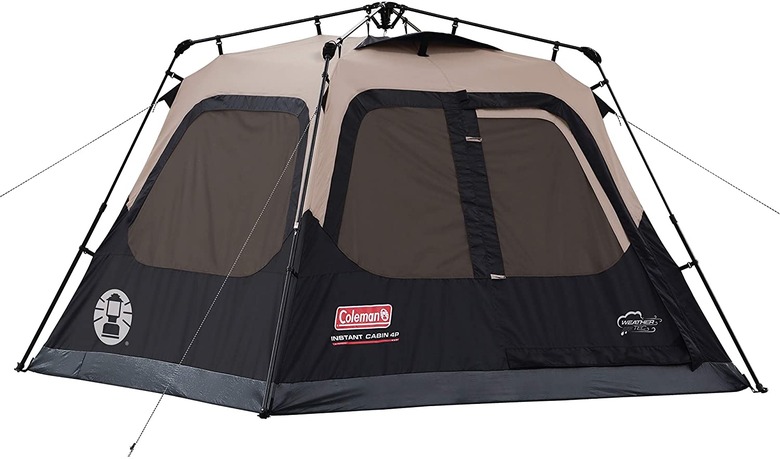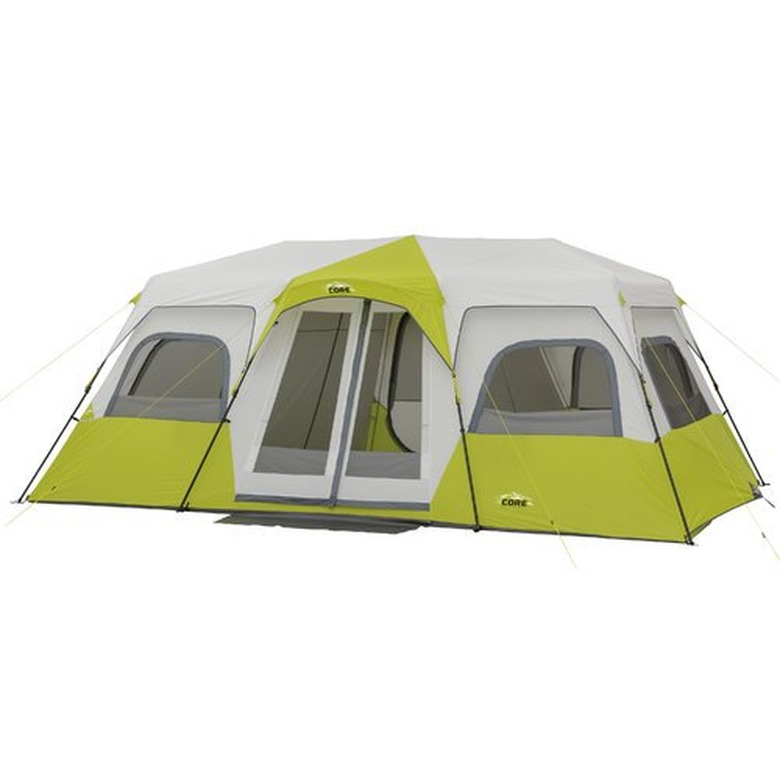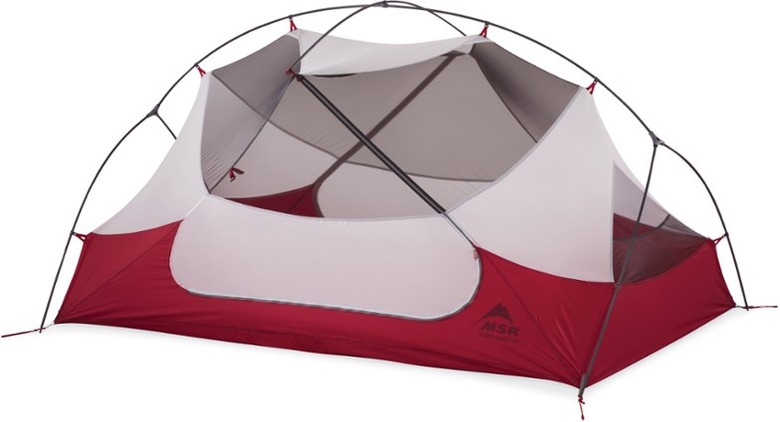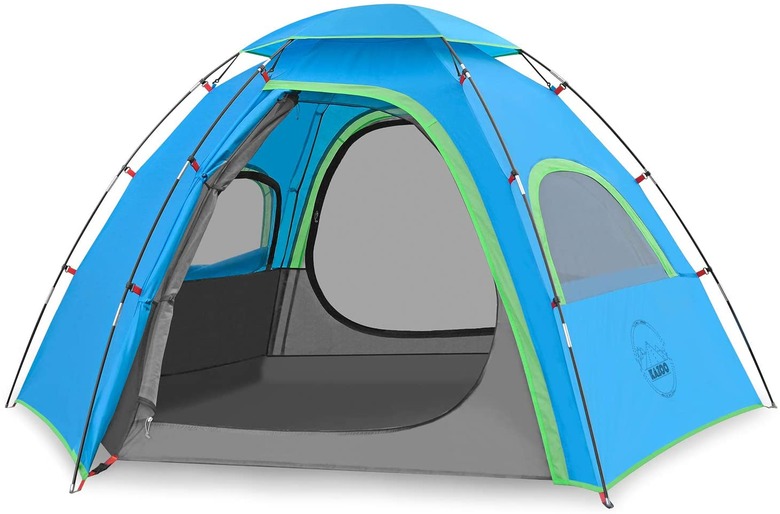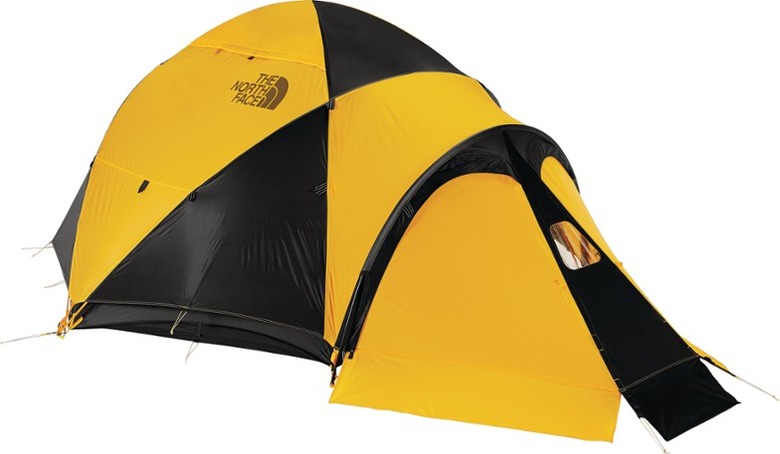The Best Tent For You Based On Your Camping Style
We may receive a commission on purchases made from links.
Feeling the call of the wild? If you're looking to take a camping trip, you'll need to ensure you've got the appropriate gear, and that most definitely includes a tent. You might be surprised at the vast range of tents on the market — we know we were — so we've put together a helpful breakdown of some of the most common types of camping tents and what type of camper is best suited for each.
If You’re a Newbie: Pop-Up or Instant
If You're a Newbie: Pop-Up or Instant
"Pop-up or instant tents are great for those trying to get into camping for the first time," Lindsey Maxwell of alternative home setup site Where You Make It tells Hunker. "They're easier to assemble and tear down to get right to your camping adventure with your family. You won't have to spend a long time trying to figure out a more complex tent setup."
The downsides to pop-up tents, however, are that they're often a bit more expensive than other types of tents, not all of them have great weatherproofing or ventilation, and they can get a little bulky when packed down. Ideally, pop-up tents are best used if you're driving to your campsite rather than hiking, or if you're camping in your backyard.
Buy It Now: 4-Person Coleman Cabin Tent with Instant Setup, $137.99
If You’re a Newbie Who Doesn’t Want to Look New: Dome
If You're a Newbie Who Doesn't Want to Look New: Dome
"If you are looking for a strong, wind-buffering tent that makes you look like a pro on the trails then the dome-style is the way to go," Greer Ferguson, manager of Outdoor Gear Exchange in Vermont, tells Hunker.
They're relatively easy to set up, but they're a lot sturdier than a pop-up tent. Just be aware that you'll have to do some ducking while you're moving around a dome-style tent. "The issue with these tents is overhead space," she adds.
Buy It Now: North Face Sequoia 2 Person Tent, $159
If You’re Camping with a Family: Cabin-Style
If You're Camping with a Family: Cabin-Style
"Cabin-style tents usually have standing room and are, unsurprisingly, shaped like a cabin," says Ferguson. "They will have a harder time in high winds and will take up much more room usually, but many of them have room dividers and garages, which makes living out of a tent for a whole family much easier."
Like pop-up tents, cabin-style tents are great for campers who are getting to their campsite via a car — they can be heavier and bulkier when packed — or backyard campers.
Buy It Now: Core Equipment Instant Cabin 12 Person Tent, $309.99
If You’re Old-School: A-Frame
If You're Old-School: A-Frame
"A-frame tents are the classic tent shape," Robin Tuck of travel site and community Elite Jetsetter tells Hunker. "Two poles hold up the tent, and they're super easy to put up." Though A-frame tents are iconic and very sturdy, they're actually not used very often anymore. "These tend to be heavy and bulky to pack," says Tuck.
Buy It Now: Woods A-Frame 3-Person 3-Season Tent, $200
If You’re a Trekker: Backpacking
If You're a Trekker: Backpacking
These tents are, as you might expect, ideal for those on backpacking trips. "Backpacking tents are as lightweight as possible so they're very small to pack," says Tuck, "But once they're set up, there's limited headroom and space, and they don't come in large sizes."
Backpacking tents are definitely more commonly purchased by experienced campers — if you're hiking into the backcountry, you need to be well prepared! But novices can certainly buy a backpacking tent too, especially if you're hiking out to your campsite.
Buy It Now: MSR Hubba Hubba NX 2 Tent, $449.95
If Nature Calls Frequently at Night: Multi-Door
If Nature Calls Frequently at Night: Multi-Door
A multi-door tent isn't a specific type of tent, per se — different styles of tents can have multiple doors — but it's definitely something to consider if you're camping with another person. "If you are the type to be up once or twice a night when nature calls or have children or pets who will be coming in and out often, it is worth it to have at least two doors," says Ferguson. "Trust me, your partner will appreciate you not stepping on their face as you try to get out the single door at the head of the tent in the dark because you can't find your headlamp but you really have to use the bathroom."
Buy It Now: KAZOO Outdoor Camping Tent, $89.90
If You’re Camping in the Winter: Four-Season
If You're Camping in the Winter: Four-Season
Four-season tents are actually somewhat misnamed. "There is very little reason to spend more money to get a four-season tent unless you are truly planning on testing this baby out in the middle of winter in a snowstorm," says Ferguson. "In fact, four-season tents will not be very helpful in non-winter conditions. Due to the difference in the materials, layers, and walls, they are not breathable and will cause excessive condensation to accumulate inside the tent."
If you're camping in any season but winter, which is the case for most casual campers out there, you'll want to go with a three-season tent, which typically has far better ventilation.
Buy It Now: The North Face VE 25 Tent with Footprint, $749

